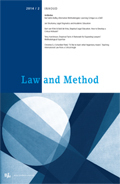|
In this paper, an attempt is made to work out a methodology for comparative legal research, which goes beyond the ‘functional method’ or methodological scepticism. |

| Article |
|
| Authors | mr.dr. Maria Geertruida IJzermans |
| Article |
|
| Authors | Mark Van Hoecke |
| AbstractAuthor's information |
| Article |
|
| Authors | Jaap Hage |
| Abstract |
In this article I plead for utilitarianism as guideline for the editor. The article consists mostly of rebuttals of a number of traditional objections against utilitarianism. In particular (but not exclusively) the following objections are discussed: A substantial part of the article consists of a discussion of coherentism as method for, amongst others, normative reasoning. |
| Article |
|
| Authors | Francisca Christina Wilhelmina de Graaf LL.M |
| AbstractAuthor's information |
|
Central to this contribution is the question whether Dworkin’s theory of constructive interpretation as a method of applying law for the judge, can be used as a method of legal-dogmatic research. Constructive interpretation is a method of legal interpretation that aims to find a normative unity in the diversity of rules that characterize a legal system. In order to find an answer to this question, the key elements of Dworkin’s theory are explained and applied to the author’s PhD research. Methodological difficulties that could give rise to problems when applying Dworkin’s theory, are investigated. In the end, the author concludes that since the judge and the scholar use quite the same methods when interpreting law, the principles of constructivism should fit legal research well, even though some aspects of Dworkin’s theory are difficult to operationalize in practice. As a leading notion however, constructivism constitutes a workable method of legal research. |


